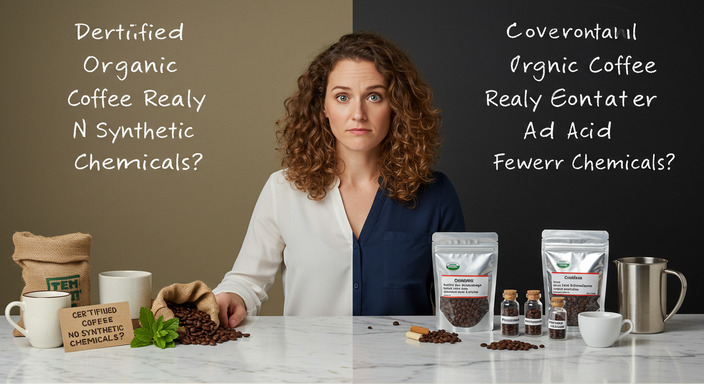
Can Flavored Coffee Be Organic? Exploring the Possibilities

Table of Contents
ToggleWhat Makes Coffee Organic?
Definition of Organic Coffee and Certification Standards
Organic coffee is grown and processed following strict guidelines that prioritize environmental health and sustainability. To be labeled as organic, coffee must meet specific standards set by regulatory bodies like the USDA. These standards include:
- No use of synthetic fertilizers or pesticides.
- Shade-grown practices that protect ecosystems.
- Compliance with fair trade and sustainable farming principles.
Certification ensures that the coffee you drink is produced in a way that benefits both the planet and the people involved in its cultivation.
Importance of Sustainable Farming Practices
Sustainable farming is at the heart of organic coffee production. Farmers who grow organic coffee often use techniques that:
- Promote soil health through composting and crop rotation.
- Conserve water and reduce waste.
- Protect biodiversity by maintaining natural habitats.
These practices not only reduce the environmental footprint but also support the long-term viability of coffee farming communities.
Health Benefits of Choosing Organic Coffee
Choosing organic coffee can have a positive impact on your health. Because it is grown without synthetic chemicals, it reduces your exposure to:
- Pesticides and herbicides, which can be harmful to human health.
- Artificial additives used in processing.
Additionally, organic coffee often has a richer flavor profile due to the natural growing conditions, making it a healthier and more enjoyable choice for coffee lovers.
The Basics of Flavored Coffee
How Flavored Coffee is Made: Natural vs. Artificial Flavorings
Flavored coffee is created by infusing roasted coffee beans with specific flavors, which can be derived from either natural or artificial sources. Natural flavorings are extracted from real ingredients like fruits, nuts, spices, or essential oils, offering a more authentic taste. On the other hand, artificial flavorings are chemically synthesized to mimic specific flavors. While both methods can produce delicious results, natural flavorings are often preferred by those seeking a cleaner, more eco-conscious choice.
Popular Flavor Options and Their Origins
Flavored coffee comes in a wide variety of options, each with its own unique origin and appeal. Some of the most popular flavors include:
- Vanilla – Derived from vanilla beans, this classic flavor adds a sweet, creamy note to coffee.
- Hazelnut – Inspired by the rich, nutty taste of hazelnuts, this flavor is a favorite for its warmth and depth.
- Caramel – Created from caramelized sugar, this flavor brings a buttery sweetness to your cup.
- Mocha – A blend of coffee and chocolate, this flavor is a nod to the traditional mocha beverage.
These flavors often draw inspiration from culinary traditions, making them both familiar and comforting.
The Role of Additives in Flavored Coffee
Additives play a significant role in flavored coffee, as they are used to enhance or stabilize the flavors. However, not all additives are created equal. Some flavored coffees may contain synthetic chemicals or preservatives, which can detract from the natural quality of the coffee. For those prioritizing health and sustainability, it’s important to look for options that use minimal, eco-friendly additives or none at all. Organic flavored coffee, for example, often relies on natural ingredients and avoids harmful chemicals, aligning with a healthier and more ethical lifestyle.
Can Flavored Coffee Be Organic?
Criteria for Flavored Coffee to Be Considered Organic
For flavored coffee to be labeled as organic, it must meet strict standards set by organizations like the USDA. The coffee beans themselves must be grown without synthetic pesticides, herbicides, or fertilizers. Additionally, the flavoring agents used must also be organic, meaning they are derived from natural sources and processed without artificial chemicals. The entire production process, from farming to packaging, must adhere to organic certification guidelines to ensure transparency and integrity.
Challenges in Creating Organic Flavored Coffee
Creating organic flavored coffee isn’t without its hurdles. Finding organic flavoring agents that are both high-quality and sustainable can be difficult. Many conventional flavorings rely on synthetic additives or artificial ingredients, which are off-limits in organic production. Additionally, ensuring that the flavoring process doesn’t compromise the organic integrity of the coffee beans requires careful handling and specialized equipment. These challenges often make organic flavored coffee more labor-intensive and costly to produce.
Examples of Organic Flavoring Methods and Ingredients
Organic flavored coffee relies on natural, eco-friendly methods to infuse flavor. Here are some common examples:
- Essential Oils: Extracted from organic plants like vanilla beans, cinnamon bark, or citrus peels, these oils are a popular way to add flavor without synthetic additives.
- Spices and Herbs: Organic spices such as cardamom, nutmeg, or mint can be blended with coffee beans to create unique, natural flavors.
- Natural Extracts: Derived from organic sources like cocoa or almonds, these extracts are often used to enhance the coffee’s taste profile.
These methods not only preserve the organic status of the coffee but also align with sustainable and health-conscious practices.
Benefits of Organic Flavored Coffee
Health Advantages of Avoiding Synthetic Chemicals
When you choose organic flavored coffee, you’re not just indulging in a delicious beverage—you’re also making a healthier choice for your body. Organic coffee is grown without the use of synthetic pesticides, herbicides, or fertilizers, which means you avoid consuming potentially harmful chemical residues. These substances, often found in conventionally grown coffee, can have long-term effects on health. By opting for organic, you reduce your exposure to these toxins, supporting a cleaner and more natural lifestyle.
Moreover, organic farming practices often emphasize the use of natural methods to enhance soil fertility, which can lead to coffee beans that are richer in antioxidants. These antioxidants, such as chlorogenic acid, are known for their potential to reduce inflammation and support overall well-being. So, every sip of organic flavored coffee not only tastes good but also contributes to your health.
Environmental Impact of Organic Farming
Organic coffee farming is a more sustainable approach that benefits the planet. Unlike conventional methods, organic farming avoids synthetic chemicals that can contaminate soil, water, and air. Instead, it relies on practices like crop rotation, composting, and natural pest control to maintain healthy ecosystems. This helps preserve biodiversity, protect pollinators like bees, and maintain the integrity of the surrounding environment.
Additionally, organic farming often uses shade-grown methods, where coffee plants are grown under a canopy of trees. This not only reduces the need for artificial irrigation but also helps combat deforestation and supports carbon sequestration, making it a more climate-friendly choice. By choosing organic flavored coffee, you’re supporting farming practices that prioritize the health of the planet.
Supporting Ethical and Fair-Trade Practices
When you purchase organic flavored coffee, you’re often supporting fair-trade and ethical practices that benefit both farmers and their communities. Organic certifications typically go hand-in-hand with fair-trade standards, ensuring that farmers are paid fair wages and work in safe conditions. This helps improve their quality of life and fosters sustainable economic development in coffee-growing regions.
Fair-trade practices also encourage transparency and accountability in the supply chain, so you can feel confident that your purchase is making a positive impact. By choosing organic and fair-trade coffee, you’re contributing to a system that values people and the planet, not just profit.
How to Identify Truly Organic Flavored Coffee
Reading Labels and Understanding Certifications
When shopping for organic flavored coffee, the first step is to read the label carefully. Look for certifications like USDA Organic, which ensures the coffee meets strict organic farming standards. Other certifications to watch for include Fair Trade and Rainforest Alliance, which emphasize ethical and sustainable practices. Be cautious of terms like “natural” or “made with organic ingredients,” as they don’t guarantee the product is fully organic.
Trusted Brands and Products to Look For
Some brands have built a reputation for their commitment to organic and sustainable practices. Here are a few to consider:
- Equal Exchange – Known for their fair trade and organic coffee offerings.
- Allegro Coffee – A pioneer in organic coffee with a wide range of flavored options.
- Lavazza Organic – Offers high-quality organic coffee with a focus on sustainability.
These brands often provide transparency about their sourcing and production methods, making it easier to trust their organic claims.
Tips for Verifying Organic Claims
To ensure you’re buying truly organic flavored coffee, follow these tips:
- Check for third-party certifications – These are more reliable than self-made claims.
- Research the brand – Look into their farming practices and commitment to sustainability.
- Read reviews – Other consumers’ experiences can provide valuable insights.
- Contact the company – If in doubt, reach out to the manufacturer for clarification.
By taking these steps, you can feel confident that your flavored coffee aligns with your values and supports a healthier planet.
Making the Switch to Organic Flavored Coffee
Why It’s Worth the Investment for Your Health and the Planet
Switching to organic flavored coffee is more than just a treat for your taste buds—it’s a step toward a healthier you and a healthier planet. Organic coffee is grown without synthetic pesticides or fertilizers, which means fewer harmful chemicals in your cup and in the environment. By choosing organic, you’re supporting farming practices that prioritize soil health, biodiversity, and water conservation. Plus, organic certification often ensures fair labor practices, making it an ethical choice as well. It’s a small change that can have a big impact on your well-being and the world around you.
How to Incorporate Organic Flavored Coffee into Your Routine
Making the switch to organic flavored coffee is easier than you might think. Start by replacing your usual coffee with organic options during your next grocery run. Many brands offer a variety of flavors, from classic vanilla and hazelnut to unique blends like caramel macchiato or cinnamon spice. Experiment with different flavors to find your favorites. Here are a few simple ways to make organic flavored coffee a part of your daily routine:
- Brew a cup as your morning ritual to kickstart your day.
- Use it as a base for iced coffee or lattes for a refreshing treat.
- Pair it with a snack or dessert to elevate your coffee break.
Pairing Flavors with Brewing Methods for the Best Experience
To get the most out of your organic flavored coffee, consider how the brewing method can enhance its unique taste. For example:
- French Press: Ideal for bold flavors like mocha or dark chocolate, as it allows the oils and rich notes to shine.
- Pour-Over: Perfect for lighter, fruitier flavors such as berry or citrus, highlighting their delicate aromas.
- Espresso Machine: Great for creamy flavors like vanilla or caramel, creating a smooth, indulgent base for lattes or cappuccinos.
Experimenting with different brewing techniques can help you discover new dimensions of flavor in your organic coffee and make every sip a memorable experience.
Conclusion: A Sustainable and Flavorful Choice
As we’ve explored, organic flavored coffee offers a unique blend of sustainability, health benefits, and delicious flavor. By choosing organic, you’re not only treating yourself to a high-quality cup of coffee but also supporting practices that protect the environment and promote ethical farming.
Recap of the Benefits
- Healthier Choice: Free from synthetic pesticides and chemicals, organic coffee is a cleaner option for your body.
- Eco-Friendly: Organic farming reduces environmental harm, preserving soil health and biodiversity.
- Ethical Support: By purchasing organic, you’re supporting fair wages and better working conditions for farmers.
- Rich Flavor: Natural flavoring methods ensure your coffee is bursting with taste without artificial additives.
Make Informed, Eco-Conscious Decisions
Every purchase you make is a chance to vote for the kind of world you want to live in. By choosing organic flavored coffee, you’re making a statement about your values: health, sustainability, and fairness. It’s a small step that can create a big impact over time.
Call-to-Action: Try Organic Flavored Coffee Today!
Ready to experience the difference? Whether you’re a seasoned coffee lover or just starting your journey, organic flavored coffee is a choice worth exploring. Visit your local organic store or shop online to find a variety of flavors that suit your taste. Your body, the planet, and the farmers behind your coffee will thank you.
FAQ
Is organic flavored coffee more expensive? While it may cost a bit more, the benefits to your health, the environment, and ethical farming practices make it a worthwhile investment. Where can I buy organic flavored coffee? You can find it at health food stores, specialty coffee shops, or online retailers. Look for certifications like USDA Organic to ensure authenticity. Does organic flavored coffee taste different? Yes! Organic coffee often has a cleaner, more vibrant flavor profile, especially when natural methods are used for flavoring.
is an editor at Coffee With Finance and a true coffee enthusiast. He explores roasts, flavors, origins, and brewing methods, sharing stories that captivate both beginners and experts. Petter believes great coffee sparks meaningful moments—and that includes simple, jargon-free talks about personal finance. His content blends aroma, flavor, and insight, making each coffee break an inspiring and enriching experience.




























Post Comment